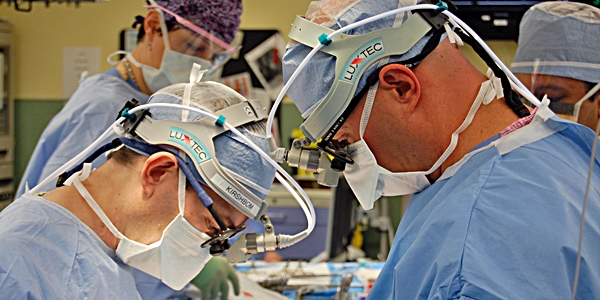When gathering with family this holiday season, instead of bringing up politics, ask your family about their health history. It may save your life.
 Jason Dranove, MD
Jason Dranove, MD
Jason Dranove, MD, with his wife and young daughter. The pediatric gastroenterologist at Levine Children's Hospital made the choice to speak with a genetic counselor after an uncle was diagnosed with breast cancer.
The doctor’s first step? Getting his father tested for the mutation.

Dr. Dranove said after he tested positive for the BRCA1 gene, he made the decision to get a mastectomy.
If his father tested negative, then neither he nor any of his siblings could have the gene. But ultimately, his father tested positive – and that meant that Dr. Dranove, along with his brother and sister, would need to take the test.
His siblings went first, and both were negative. “I was the last one to get tested. I could tell by the tone of the voice over the phone that I tested positive,” says Dr. Dranove. “But by then, I had already met with Stacy (Lenarcic) and she explained what the results would mean. I was prepared for this news.”
With the positive test results in, Dr. Dranove and his wife went back to meet with Lenarcic. “I wanted my wife to come with me, since this news has implications for our daughter and our future kids,” he says. She recommended Dr. Dranove meet with Levine Cancer Institute surgical oncologist Richard White, MD, who could counsel them on what to do next.
“Breast cancer in men is rare, but it does happen,” says Dr. White. “About 1 percent of all breast cancer cases in the United States are men, but since men have much less breast tissue compared to women, they’re not routinely screened for breast cancer,” said Dr. White.
In Dr. Dranove’s case, he had an inherited gene mutation and a strong family history of breast cancer. That made his best next step a mammogram – yes, men can get them – which could help detect breast cancer early, before he started showing symptoms. His mammogram results showed a high enough risk for Dr. White to recommend a preventive mastectomy: surgery to remove one or both breasts to reduce the risk of developing breast cancer.
Since Dr. Dranove’s condition wasn’t urgent, he waited nearly a year to have the surgery, getting the procedure done in the spring of 2016. “I was back at work in two weeks,” says Dr. Dranove. “And sure enough, they ended up finding an early stage of breast cancer.” Going forward, he’ll continue to be monitored with checkups and mammograms.
Dr. Dranove says he’s grateful for having done the counseling, the testing and the procedure. And he’s thankful he didn’t ignore the warning signs of his family history – even with a type of cancer not common to men.
“Men still can get breast cancer,” he says. “And even if they don’t have it, men can still pass the gene on to their kids. Even if you don’t want to do it, do it for your kids and your wife!”
Family Health History Questions
Ask your parents, siblings, grandparents, aunts, uncles, nieces, and nephews:- Do you have any chronic diseases, such as heart disease or diabetes, or health conditions, such as high blood pressure or high cholesterol?
- Have you had any other serious diseases, such as cancer or stroke? What type of cancer?
- How old were you when each of these diseases or health conditions was diagnosed? (If your relative doesn't remember the exact age, knowing the approximate age is still useful.)
- What is your family's ancestry? From what countries or regions did your ancestors come to the United States?
- What were the causes and ages of death for relatives who have died?



